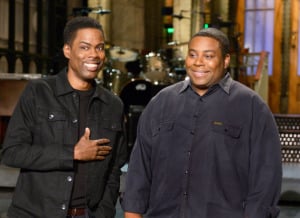Opening your stand-up comedy set with a joke about the Boston Marathon bombing might make people a little tense. You don’t have to be a comedy aficionado to foresee that. So legendary stand-up comedian Chris Rock certainly knew what he was getting into at the beginning of his monologue on last week’s episode of “Saturday Night Live.” He said the words “Boston Marathon” and the “SNL” studio audience froze. Rock’s controversial monologue was an uphill battle from there, but in the end Rock managed to deliver a vintage performance.
That first bit, though — yikes. Rock’s night as “SNL” host almost went off the rails before it even began. It wasn’t just that the subject matter of the bit was jarring — Rock has made a career of “did he just say that?!”-gasp-inducing humor. It wasn’t just that the set-up ran too long for its weak beats, whether it was name-dropping Uber for points with the 18-34 demographic or wincing at a woman’s bleeding nipples. The bit flopped its way to the finish mainly because Rock seemed uncomfortable. Rock’s brand of humor is predicated on the tightness of delivery. Every exclamation, every overplayed physical tic must land right on schedule. But Saturday, Rock began in a hesitant fashion, and the stumbles and unnecessary syllables put the audience on edge.
Thankfully, the bit’s punchline was pure gold, buoyed by Rock’s classic bugged-out eyes. Rock locked into a groove. His next bit, about the recently opened Freedom Tower, was the high point of the monologue. Rock outlined the strong premise of the joke: “They should change the name from the Freedom Tower to the Never Going in There Tower – cause I’m never going in there.” The studio audience knew he was on to something. Then Rock’s voice cracked sky-high from disbelief and astonishment (“Are you kidding me?!”) and the audience knew it was home free — finally, the first big laugh of the night. The audience still seemed somewhat uncomfortable with the subject matter, but Rock had turned the momentum of the room and was in fine form for the rest of the monologue.
Of course, the Internet echo chamber doesn’t lie silent for long when a big-name comedian digs into provocative topics. Rock’s first two bits have been the focus of a storm of controversy — par for the course for Rock. He has always yelled the things that other people are thinking but are afraid to say out loud. Yet Rock can’t be accused of blunt insensitivity toward victims of terrorism. Rock was careful to avoid making light of their pain – his Boston Marathon bit actually highlights the terrible atrocities of the bombing. Critics can only claim that Rock offensively made light of big, serious issues like terrorism, issues they see as too big and too serious for comedy.

Rock – and comedians in general – heartily disagree with this prohibition. Comedy is necessary for normalcy, necessary to combat the fear of serious issues. “SNL” recognized this in its first episode after 9/11. Executive producer Lorne Michaels famously asked then-New York City Mayor Rudolph Giuliani, “Can we be funny?” Giuliani zinged back, “Why start now?” When Rock says that New York City is fine after 9/11 and Boston is fine after the marathon bombing, this is an essential part of normalcy that is comedy. To be fine is to be able to laugh.
Rock is actually performing an essential task with his controversial humor. He is trying to wake an “SNL” audience that has become timid and accustomed to humor without bite. (There’s no way today’s “SNL” would produce anything like the incendiary Richard Pryor-Chevy Chase word association sketch of the seventies.) Rock may have mellowed and matured since his mid-nineties, “Bring the Pain”-era stand-up comedy heyday — life in a mansion in New Jersey tends to sand one’s edges. But he is still ferocious enough – and funny enough – to get people thinking about things that matter.
Contact Alex Cheng at aexcheng ‘at’ stanford.edu.
